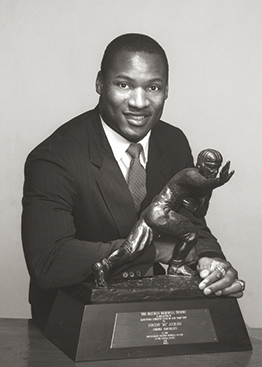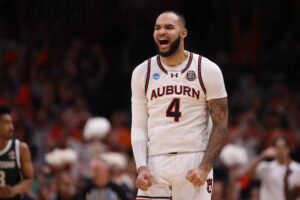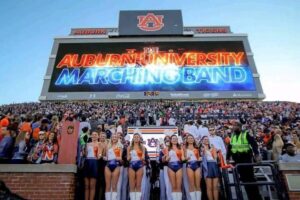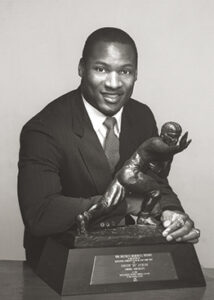
Bo Jackson Voted Greatest College Football Player of All Time, Surpassing Tim Tebow, Herschel Waker, Barry Sanders, and Earl Campbell
In a sport defined by legends and larger-than-life figures, only a few athletes transcend eras to earn the title of “the greatest.” Now, in a poll conducted among college football historians, coaches, former players, and fans, Auburn’s iconic running back Bo Jackson has been voted the greatest college football player of all time, outshining a star-studded list that includes Florida’s Tim Tebow, Georgia’s Herschel Walker, Oklahoma’s Barry Sanders, and Texas’ Earl Campbell.
The result may not come as a surprise to those who witnessed Jackson’s astonishing blend of power, speed, and grace during his time on The Plains. But surpassing such a revered lineup underscores just how monumental Jackson’s legacy remains decades after his final collegiate snap.
The Bo Phenomenon: A Once-in-a-Lifetime Talent
Born in Bessemer, Alabama, Vincent Edward “Bo” Jackson arrived at Auburn University in 1982 with high expectations and left as a living legend. From the moment he stepped on the field, Jackson redefined what was physically possible for a running back. At 6-foot-1 and 225 pounds, he combined sprinter speed with linebacker strength. He wasn’t just a football player—he was a force of nature.
In his four seasons at Auburn, Jackson rushed for 4,303 yards and 43 touchdowns, including a Heisman Trophy-winning senior campaign in 1985 where he tallied 1,786 rushing yards and 17 touchdowns. He averaged 6.6 yards per carry over his career—an absurd number for someone facing SEC defenses week in and week out.
What made Jackson unique was not just the stats—but the style. Every run was a potential highlight reel. He could stiff-arm a linebacker into the dirt, hurdle a cornerback in stride, and outrun safeties with Olympic-level speed. In fact, Jackson qualified for NCAA track championships and once ran a 4.12-second 40-yard dash, a time that still baffles strength and conditioning coaches today.
More Than a Football Player
Bo Jackson’s legacy isn’t confined to his college football dominance. He became the only athlete in history to be named an All-Star in both the NFL and MLB, cementing his mythos. But his college football career is the foundation of the legend. He wasn’t just a multi-sport athlete—he was a multi-dimensional threat to every team he faced.
Still, the latest vote was strictly about college football. And even in that limited scope, Jackson stood out.
He won the 1985 Heisman Trophy over Iowa quarterback Chuck Long and BYU’s Robbie Bosco in one of the most celebrated voting races in the award’s history. That season, he put together signature performances, including a 240-yard, 3-touchdown game against Florida State and a 176-yard game versus Alabama in the Iron Bowl.
Jackson played during an era of bruising defenses and run-heavy schemes, yet still managed to produce jaw-dropping statistics and electrifying moments that live on in highlight reels today.
The Case Against the Competition
To appreciate Bo’s ascension to the top of the “Greatest of All Time” list, one must also look at the legends he surpassed.
Tim Tebow (Florida)
Perhaps the most iconic quarterback in college football history, Tebow was a two-time national champion, a Heisman winner in 2007, and a three-time finalist. Known for his leadership, physicality, and unique dual-threat capability, Tebow revolutionized the quarterback position in the SEC. His resume includes 9,285 passing yards, 88 touchdowns, and another 2,947 rushing yards with 57 rushing scores.
Tebow’s greatness was built on intangibles as much as statistics. He was the emotional center of Urban Meyer’s dominant Florida teams from 2006–2009 and remains one of the sport’s most popular figures.
But while Tebow’s career was brilliant, his detractors point to the strength of the team around him, as well as the offensive system tailored to his strengths. Jackson, by contrast, often had to shoulder Auburn’s offense almost entirely by himself.
Herschel Walker (Georgia)
A three-time All-American and 1982 Heisman winner, Walker is one of the most dominant runners in college football history. In just three years, he racked up 5,259 rushing yards and 49 touchdowns, setting SEC records that stood for decades. His freshman year (1980) remains one of the greatest ever, leading Georgia to a national title.
Walker’s size-speed combo was ahead of its time. His 1,891-yard junior season solidified his place as a college football titan. Yet some argue that Jackson faced tougher competition and delivered more explosive plays.
While the Walker vs. Jackson debate has raged for years, Bo’s versatility and otherworldly athleticism may have given him the edge in this poll.
Barry Sanders (Oklahoma State)
Sanders had perhaps the greatest individual season in the history of the sport in 1988. He ran for 2,628 yards and 37 touchdowns in just 11 games—unreal numbers even by today’s standards. He won the Heisman in a landslide and immediately declared for the NFL, where he became a Hall of Famer.
The main knock against Sanders in this debate is longevity. His body of work is essentially one year—albeit the most statistically dominant year ever. Jackson, on the other hand, produced over four seasons, becoming a household name year after year.
Earl Campbell (Texas)
Campbell won the 1977 Heisman Trophy and finished his Longhorns career with 4,443 rushing yards and 40 touchdowns. A bulldozing runner with unmatched power, Campbell was a nightmare to tackle and became the prototype for future power backs. He led Texas to an undefeated regular season in 1977.
While Campbell’s power was legendary, he lacked the breakaway speed and dual-sport mystique that elevated Jackson to mythical status.
Why Bo Jackson Stands Alone
Bo Jackson is more than the sum of his stats. He is a symbol of dominance. He made the extraordinary look routine. College football fans and analysts alike often describe him not just as great, but unreal.
He also carried Auburn during a period when the Tigers weren’t perennial national title contenders. He didn’t have the roster advantage of a Tim Tebow or the statistical burst of a Barry Sanders. Instead, he accumulated greatness through consistency, ferocity, and the unshakable belief that every time he touched the ball, something incredible could happen.
Moreover, Jackson’s greatness has endured. Decades later, current college athletes still cite Bo as an inspiration. His highlights circulate on social media with younger fans often disbelieving that such an athlete existed long before the modern training era.
The Fans’ Voice and Historical Recognition
The vote that crowned Jackson as the greatest of all time included ballots from media members, Hall of Fame voters, college football coaches, and fan input across platforms. What pushed Jackson over the top was not just statistical analysis, but the cultural impact he made.
Fans old enough to remember his days at Auburn recall him like folklore. Younger generations discover him through YouTube highlights and “Bo Knows” Nike campaigns. Jackson’s legacy bridges generations in a way few players ever have.
Even opponents couldn’t help but admire him. Alabama’s defense in the 1980s was consistently ranked among the best in the SEC, and yet even they couldn’t contain him. Jackson’s game-winning touchdown leap over the top in the 1982 Iron Bowl—the famous “Bo Over the Top” moment—is still one of the most cherished plays in Auburn history.
A Fitting Recognition
Jackson has long avoided the spotlight, content to live quietly in retirement and focus on philanthropy and business. He’s famously modest and downplays his greatness whenever possible. When told of the honor, Jackson simply responded, “I’m honored, but I played because I loved the game. That’s it.”
But this honor is overdue and entirely fitting.
Bo Jackson wasn’t just the best athlete to ever play college football—he was the embodiment of what makes college football great: passion, power, unpredictability, and unforgettable moments.
Final Thoughts
Bo Jackson’s crowning as the greatest college football player of all time reopens debates that will never truly be settled. Some will argue for Tebow’s leadership, Walker’s three-year dominance, Sanders’ historic season, or Campbell’s raw power.
But in Jackson, fans and analysts found the rare combination of peak performance, consistent excellence, transcendent athleticism, and lasting impact. His feats bordered on the mythical, and his highlights still draw gasps.
In a sport where greatness is often fleeting and subjective, Bo Jackson has secured immortality—not just as Auburn’s greatest, not just as a Heisman winner, but now, officially, as the greatest college football player of all time.





